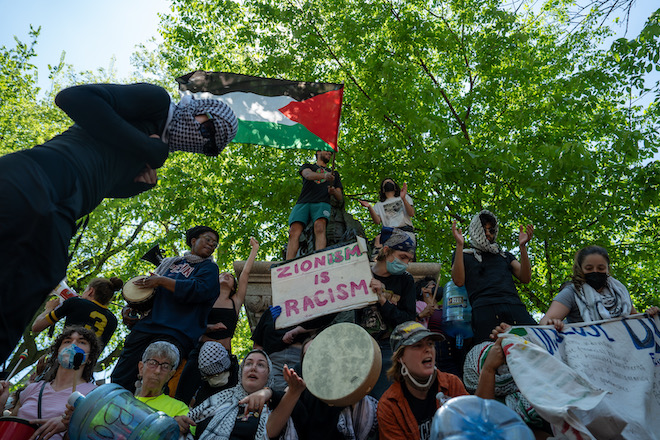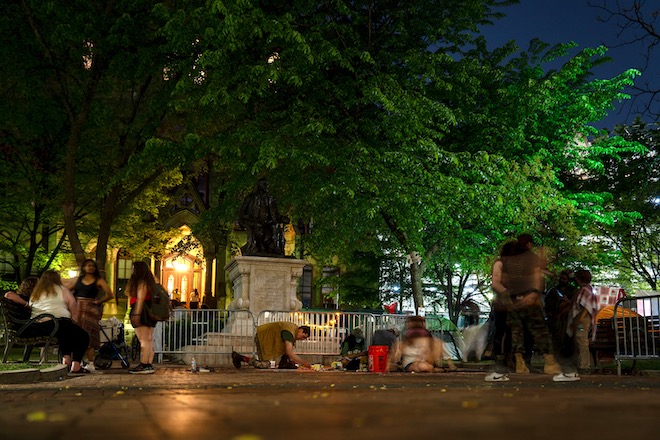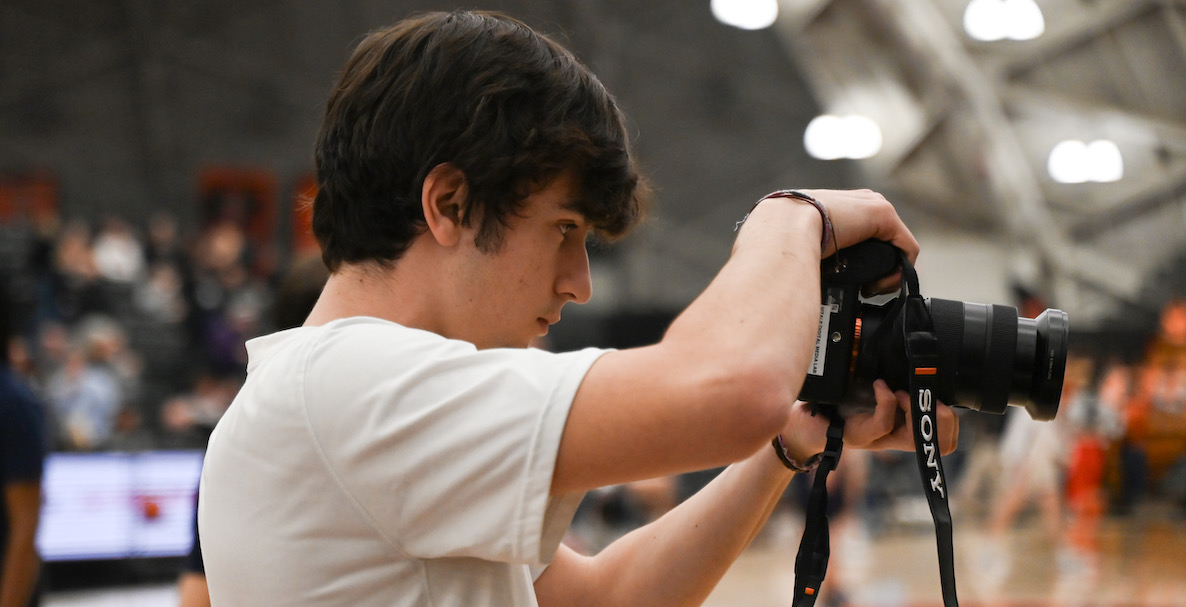The work of student journalists in America may never have been so visible as it is this year. Since Hamas’s terror attack in Israel on October 7 and Israel’s subsequent bombing of Gaza, campuses have been roiling from protests. University presidents (including the University of Pennsylvania’s Liz Magill) have been toppled. Pro-Gaza encampments have been established and, in some cases, brutally dismantled. The journalists with the most front-row view are those on and from the schools themselves; they are both witnesses and among those most affected, “covering protests and unrest in the face of great personal and academic risk,” the Pulitzer Prize Board said in a statement on Friday.
Penn freshman Ethan Young, a former Citizen intern, joined Penn’s student-run newspaper, The Daily Pennsylvanian (DP), as a general assignment photographer last fall. Little did he know that role would morph into covering a Congressional hearing on then-President Magill, and 16-hour days shooting and writing about the pro-Gaza encampments that are heading into their third week in Penn’s main square.
Where other national and local news outlets have swooped in and out during the most dramatic moments of the last several months, Young and his colleagues at Penn and around the country have been there every day, covering the loud voices, yes, but also “talking to people whom the national media has not.”
I caught up with Young over the weekend to learn more about what he’s seen and learned from his year covering Penn for the DP. This interview has been edited and condensed for clarity.
First of all, how are you doing?
Crazy busy has been the motto of this semester.
Was it your intention to be a journalist when you arrived there in the fall?
I am studying political science with a minor in legal studies and journalism. I was not expecting to be this involved, but I think that has been a real silver lining of this. It’s captivated me. I have been shocked at how meaningful the work I’ve been doing is, and also at the real response from readership. Six months ago I wasn’t necessarily thinking about becoming a journalist. Now, after this semester, it’s seeming more and more appealing.

What have you seen at Penn since October 7?
It was a little bit more complicated here, because there was an ongoing dialogue about the Palestine Writes Festival before October 7. So that kind of started the conversation and discourse on campus, and saw the administration getting involved in issues relating to antisemitism and Islamophobia. And then October 7 happened.
I’ve been essentially at every rally on both sides since then, which has been both challenging and extremely thought-provoking. People have a tendency to focus on social media highlights. By being at all of these things, I’ve really seen it all.
At Penn, there are students from so many different backgrounds, so many international students from different religious backgrounds, and I’ve seen the different ways that this conflict in the Middle East has played in people’s lives, for students here who are from Israel, or from Palestine. Seeing the ties to people’s homes and culture that they bring to these conversations is particularly enlightening. And then there are the different cross sections of peoples here who are Jewish and who are advocating for the pro-Palestinian side.
Seeing all of that has been particularly impactful. And seeing the ways that faculty and staff are engaging with students across these issues as well.
Can you give an example?
At Penn, you’ve seen Jewish organizations like [progressive Jewish social club] Chavura, who have come together on this. Just last week, we saw a large Seder by Jewish Voices for Peace here at the encampment. They have been vocal about their perspectives and interests, and that has been something that I think mainstream media is trying to ignore. It’s easier to ignore Jews who are advocating against Israel or advocating on the pro-Palestinian side. At the DP, we’ve been deliberate about having those voices, as we are with all perspectives.
You mentioned seeing professors engage with students. Is there something that stands out to you?
Students are getting a lot of attention here. But there’s some level of credibility that professors or administrators give to students when they’re advocating. We’ve seen a lot of professors making sure that students’ rights to free speech, expression and protest are being upheld. Now, with the encampment, things are even more complicated, because of involvement with the police and Penn Division of Public Safety, and so the American Association of University Professors have been pretty vocal about making sure that students’ rights to free speech have been upheld.
We’re seeing professors using their resources, the power they have to book spaces on campus for various film screenings and more concrete programming where people are bringing in experts, on all sides of this. Before the encampment began, there were pretty consistent dialogues and workshops; the School of Arts and Sciences had a series on “Living the Hard Promise” that tried to bring in experts. And so in addition to the protests, there have been spaces or at least attempts to create spaces for productive dialogue.
You’re in the thick of it, because you’re covering all of this drama, but also a little bit at arms length as a reporter. What’s it been like?
Over the past week, I’ve done 16-hour days sitting outside Van Pelt Library, starting at five in the morning last Sunday. I’ve been super present. And the DP has been super present, talking to everyone we can.
Being a journalist at Penn this year has been an incredible experience. I’m going to D.C. and sitting six feet away from President Magill while she was testifying in front of Congress, and going to these rallies. I mean, my work was in Politico and cited in the New York Times and Congressional documents. So that part’s been great.
We’re talking to people who the national media has not. And we’ve been covering this almost every day since last fall.
And it’s been difficult as well. Being a student journalist is a different dynamic. Again, we’ve been here, as CNN and the Inquirer and NBC and the AP have all come in. But it’s different because I am in classes with kids who I’m seeing in the encampment, and I’m in classes and clubs with the kids who are in the counter demonstration. So it’s a different level of connectedness than these national outlets are having. But I think it’s incredibly important to be putting in the time and effort to tell the story accurately and impartially. As students, we have a unique way to do that, because this is our campus. And while the news cycle undoubtedly is going to rotate over this at some point, this continues to matter a lot to Penn’s campus and to the DP.
What is your understanding of what the encampment’s demands are?
They’ve been very clear with those demands. The three demands are: for Penn to disclose their investments; to divest from companies that are benefiting off of the “Israeli genocide” as they put it; and then for Penn to offer amnesty for pro-Palestinian students who have been involved and disciplined for previous pro-Palestinian demonstrations here on campus.
And what has been the reaction from the administration?
We are not in the room when they discuss things. But I know that Penn released an official statement saying that Penn “strongly opposes sanctions, boycotts, or disinvestment targeted against Israel.” [Penn has also pointed to a 2016 state law that prohibits the state from doing business with any organization that boycotts or divests from Israel.]
Personally, I think seeing how last week played out was interesting. You know, there aren’t many schools that have had a situation similar to Penn. We’ve seen places where there have been either arrests [like UCLA or Columbia]; there have been successful negotiations with members of camps and the administration [like Brown University]. We’re not really seeing either here. A week from last Friday [on April 26], the encampment was ordered to disband by the administration. We haven’t seen negotiations, according to both the administration and the encampment. And, there’s been no concrete threats of arrest or any indication that arrests are imminent.
And what do you think of all this?
I’m not going to weigh in on who is right, but I do think that this shows you that people can be right about different things. Just thinking about this year: At first, we were lucky if we had productive conversations, especially after October 7. There were not a lot of people acknowledging the nuance of the situation, at least from what I experienced. But over the course of the year, we’ve been seeing more and more people who are able to do so. Again, not necessarily between the encampment and administrators, but at least between students and faculty who are maybe less involved. Moving forward, acknowledging that nuance of how these conversations happen is extremely important.
Tell me more about that. In the fall you think there were more people really pitted against each other, but you think now that there is more conversation happening?
Yeah, and again, I think the encampment has potentially changed the dynamics around this, but prior to that and to seeing a second wave of national outcry and activism, there were groups — Muslim student groups, Jewish student groups — who were really actively working to create those conversations. At a school where we have such a diverse student body, people coming from truly all walks of life, having the basis for dialogue is of the utmost importance.
You said this was prior to the encampment. Has that made it more difficult to have those conversations?
There have been moments where there have been tense confrontations between protesters and counter protesters. We’re again seeing that this reopens the wounds on both sides, for the reality is that this is a tragedy that more or less impacted so many people deeply and very personally. But I don’t want to go as far as to say that that’s hindering that dialogue, because I do know that there are undoubtedly still instances of productive dialogue across cultures.
How have people reacted to you, both protesters and readers?
I’ve had people on all ends of the spectrum, have their opinions on what we’re producing and what I’m producing. I think that’s all important. I think if everyone was telling us we were doing a great job, there’s probably something wrong there, and if everyone was mad at us, that’s probably a sign that something’s wrong as well. This is a constant process. We’re all students. And this is the first time where we’re doing this and covering something of this scale. I mean, it’s rare that you’re looking at the DP’s front page and The New York Times front page, and it’s the same story. We really strive to provoke, to talk, to include people who have very different viewpoints. And that undoubtedly causes some people to disagree with what we’re reporting on.
At a school where we have such a diverse student body, people coming from truly all walks of life, having the basis for dialogue is of the utmost importance.
The people that I’m working with at the DP are phenomenal. They are doing this work because they like to do it and volunteered to do it. The dedication that people have shown over the last weeks has been mind blowing. Everyone has given their all. But then you’re doing this and then you’re going back to a dorm where no one else has done anything similar for the day, and you’re kind of just getting right back into the swing of things. So it’s almost like living a double life.
And personally, I’ve had people who have been upset with how they’ve been framed and stories I’ve written. And that’s been a learning process for me, but also an opportunity for me to grow as both a person and a journalist and a student journalist who interviews people who I then see the very next day in the dining hall. It’s not the best to wake up to a text the next morning with, Hey, can we talk about how I was portrayed in that story? But I think almost all of those conversations have been extremely productive.
Has that helped your coverage?
100 percent. Having those conversations points us to blind spots; we can’t be informed about and we can’t report on things we don’t know that are happening. Oftentimes having those conversations after the fact illuminates me as to new sources, new perspectives, new stories that allow me to have better coverage.
What are you doing when you’re out there for 16 hours on the steps of Van Pelt?
It depends. On Thursday [April 25], there was no waiting around. I started at the March from City Hall, photographing and writing live updates. And then I was taking photographs and writing as the encampment was set up. So those first couple days were packed. I’d cover what was happening, go to class, and then go to sleep.
Now we’re taking a bit of a step back. Again, we’re on day 10, so also being cognizant of both how readers are reacting to content and also capacity of reporters. We’re being more more thoughtful about how we’re rotating through and, watching and listening, making our presence known to people who want to talk to us. And then also not neglecting other stories important to students at Penn.

What’s been most surprising to you about the last week or so?
Just how quickly situations change. Nothing has been constant day to day. Whether that’s programming at the encampment, the actions of counter-protesters, the pro-Israel petition on campus, the university’s response, the response of the Philadelphia Police Department. That keeps us on our toes, but also, again, highlights the importance of staying up to date with this coverage, and really focusing on what’s happening here.
What do you think people and other other media outlets have gotten wrong about their coverage of the events at Penn?
So, because our scope is Penn, we look at things that national outlets would normally look at and are like, that has absolutely no relevance to us. But we covered pretty extensively everything to do with the resignation of President Magill. Every statement, every conversation, every event that Magill spoke at between the Palestine Writes Festival, and when she resigned in December. That leads to more nuance and shows a more complete picture than national media outlets. When national news outlets find sources, they’re finding sources who are extremely vocal on social media, who are extremely vocal on the national stage, who have been interviewed by politicians, etcetera. We’re talking to people who the national media has not. And we’ve been covering this almost every day since last fall.
I also think that what we’ve done is note that this isn’t an issue in isolation, right? This ties into free speech, the role of the humanities in higher education, the role of higher education in general, the impact of schools like Penn taking a policy of institutional neutrality, things like that.
From the outside looking at Penn, it seems like the only thing anybody does or talks about is antisemitism or Islamophobia, the president, protests. Are most of the students on campus embroiled in this? Or are most people carrying on as normal?
That really depends on who the person is. But as [former Penn Chair Scott Bok] wrote in his [Inquirer] opinion column when both he and Magill resigned, the students are still being students; they are still going to class and having fun and meeting people and engaging in everything else that Penn has to offer. A lot of people are doing both, but for some people, you know, they’re more focused on one than the other. I think there are many students who’ve had a normal experience here at Penn.
What about you? Are you able to go to class and do all this?
Yes, and other extracurriculars. I’m the photographer for the basketball team. I also do some community service, I’m starting a fellowship program next year, I spend time with my friends. The DP is obviously the most time commitment, but I’m choosing to put in the time because I enjoy doing it and I think it’s important.
![]() MORE ON COLLEGE, PROTEST, AND FREE SPEECH
MORE ON COLLEGE, PROTEST, AND FREE SPEECH



